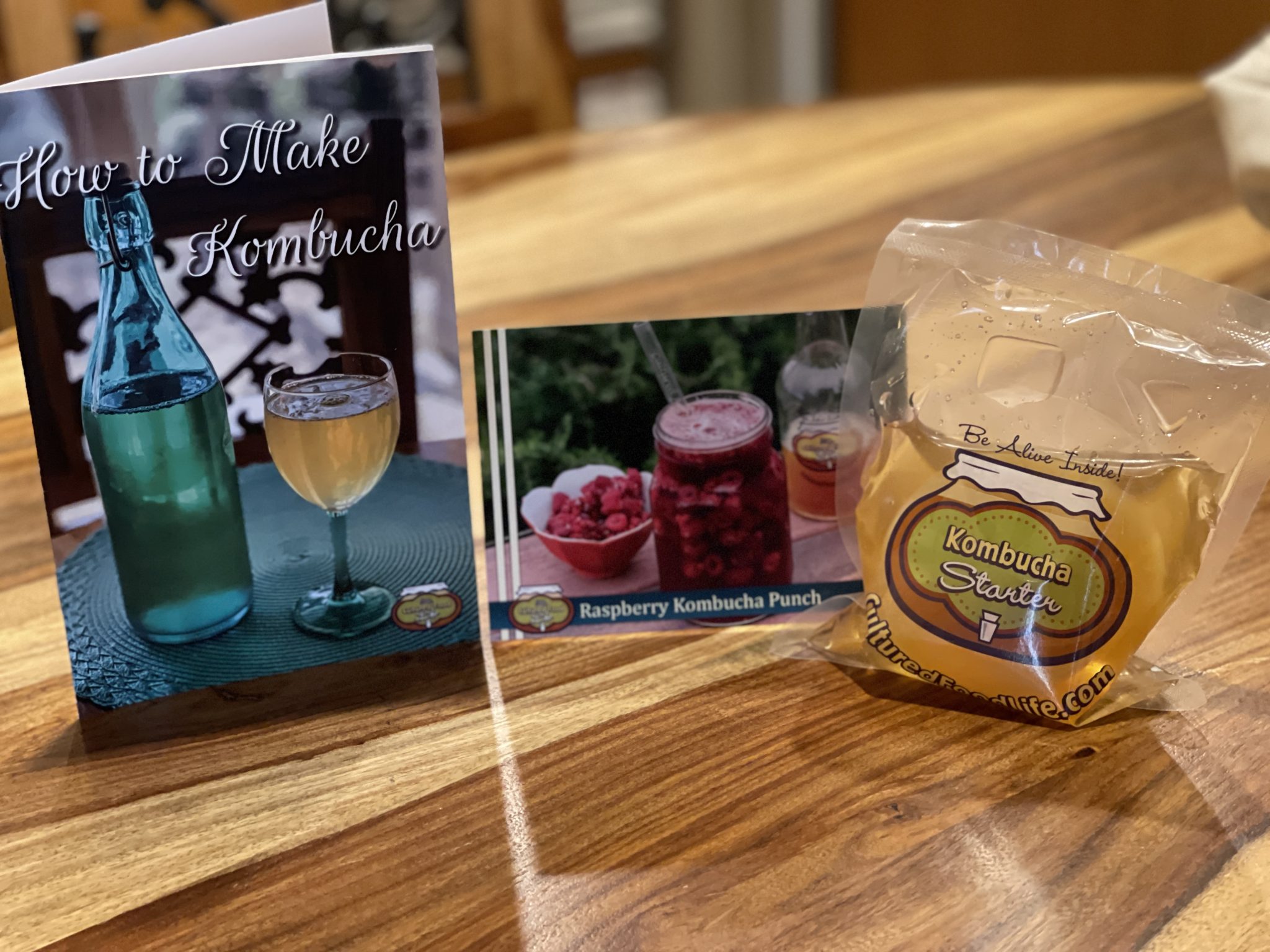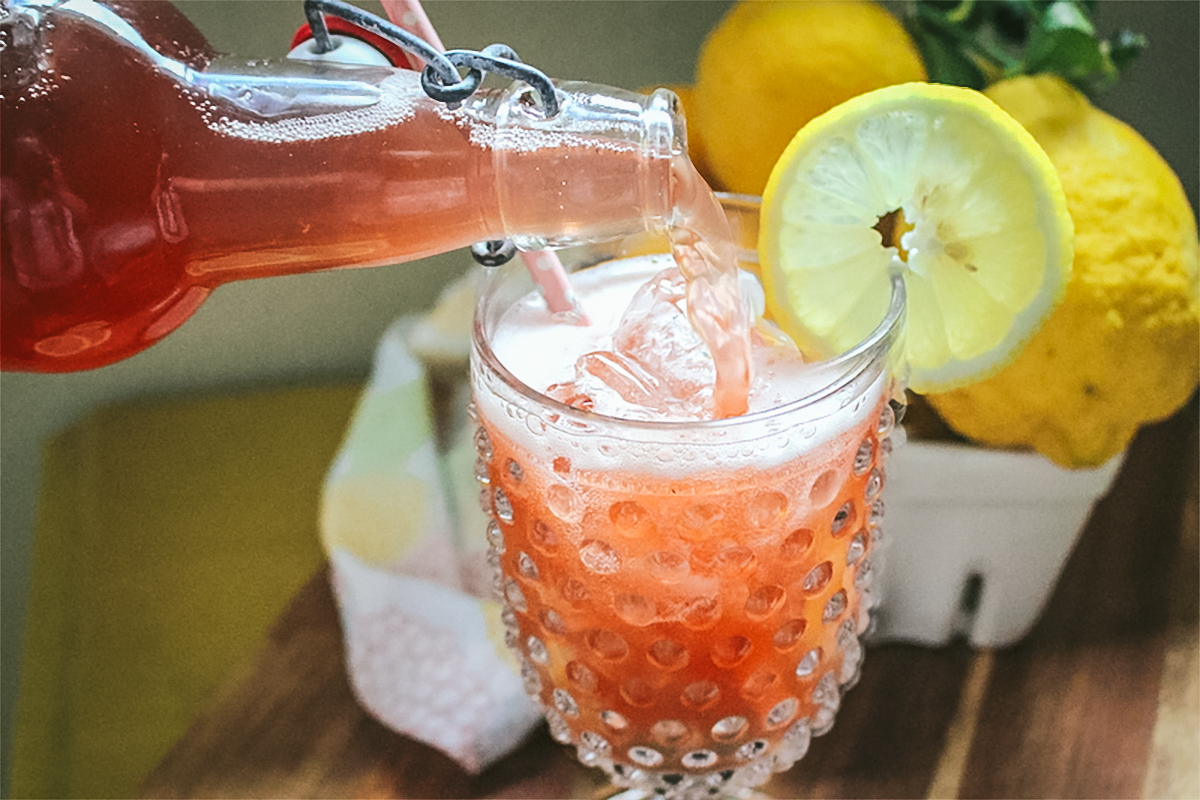
What is Kombucha?
What is Kombucha?


So what exactly is kombucha? Kombucha (pronounced come-boo-cha) is a living health drink made by fermenting tea and sugar with the kombucha culture. It has been around for hundreds of years. If you are concerned that it is made with sugar, you needn’t be. The sugar is consumed by the culture leaving you with a delicious, tart drink. The result can taste like something between sparkling apple cider and champagne, depending on what kind of tea you use. It’s not what you would imagine fermented tea to taste like. Kombucha is an amazing drink. Sales have grown to be over 600 million dollars, and this was all done strictly by word of mouth. I have watched it grow and grow. I’ve also witnessed the major soda beverage companies start to lose their credibility and hit a 30-year low in sales as people wake up to how much harm drinking large amounts of soda pop can cause.
Kombucha's Powerful Probiotic
Kombucha has a powerful probiotic which is actually a probiotic yeast called Saccharomyces Boulardii. S Boulardii is a good probiotic yeast – we need not only good bacteria, but good yeasts as well to keep us in balance. S. boulardii is unrelated to the yeast Candida albicans and other Candida species, and is one of the most researched probiotics and is used as the number one probiotic used in hospitals worldwide. S. boulardii is absent from the natural gut since it is a transient yeast that passes through the intestines after ingestion. If taken every day, it achieves a steady stream in the colon within 3 days and is cleared from the stools 2–5 days later.1 It does not attach to the mucosal cell lining but works its magic on you as it moves through the gastrointestinal tract. When S. boulardii is present, it inhibits toxins from binding to intestinal receptors and steals the metabolites it needs to survive. Thus many pathogens pass out of the body unable to survive in the presence of this powerful probiotic. They even found that other pathogen strains like E. coli, Salmonella typhimurium, and S. typhi adhere to the surface of S. boulardii, thus preventing them from attaching to the mucosal lining and passing through the body rendering them harmless. This powerful drink has many benefits, see below!
Kombucha Benefits
Kombucha has antibiotic-resistant probiotic yeast: In addition to the good bacteria in kombucha there is a special probiotic yeast called Saccharomyces Boulardii (S. boulardii) that is resistant to antibiotics, which makes it incredibly useful for maintaining a healthy gut when treating an illness with antibiotics.2
- Kombucha protects the stomach lining: It neutralizes toxins produced by harmful pathogens and sends out a signal to the body to reduce inflammation that can lead to a number of negative health outcomes. The probiotic in kombucha (S. boulardii) can also act as a decoy to harmful pathogens. It attracts and binds with the pathogens, keeping them from attaching to the intestinal wall and doing damage. 3
- Kombucha reduces joint pain: Kombucha contains acetic acid, which not only helps stabilize blood sugar but also contains an analgesic (pain reliever) and anti-arthritic compounds which help remove toxins that may have accumulated in joints causing pain and inflammation. Other compounds in kombucha include Mucoitin sulfate, Heparin and hyaluronic acid, these help provide lubrication and protection to existing joint tissue. 4
- Kombucha assists the liver in detoxification: Kombucha is full of glucuronic acid, which plays a part in one of the body's most important detoxification processes: glucuronidation, a process in which glucuronic acid binds to toxins and transforms them so they can be easily eliminated by the kidneys. The liver produces this substance naturally, but sometimes the body can’t keep up with the number of pollutants that it comes into contact with. The extra glucuronic acid in kombucha basically helps make up the difference. 5
- Kombucha helps your kidneys: Kombucha may help kidneys eliminate environmental pollutants. Every day, your kidneys process about 200 quarts of blood to remove and eliminate chemicals and toxins. Calcium builds up in the blood tissues and can cause calcification throughout the body, which can cause calcification in the kidneys (aka kidney stones). Kombucha has been used to prevent the kidneys from forming kidney stones by helping to purify and remove toxins. 6,7
- Kombucha alleviates constipation and diarrhea: The probiotic in kombucha, S. boulardii, is actually being used to treat all sorts of bowel disorders including Clostridium difficile, acute diarrhea, antibiotic-associated diarrhea, some parasitic forms of diarrhea, and other gastrointestinal disorders. It also has a record of helping reduce the symptoms of irritable bowel syndrome (IBS).8
- Kombucha - Preventive effects on heart, weight, cholesterol, and blood glucose. There is a new study on kombucha, published in the Journal of Food and Science.9 The research was carried out to understand the preventive effect of kombucha on heart weight, blood glucose, total protein, lipid profile and cardiac markers in rats with heart damage. They found that kombucha tea significantly decreased cholesterol, triglycerides, LDL and VLDL while increasing the levels of HDL. Similarly, a decrease in leakage of cardiac markers from the myocardium was also observed. When I posted this on my Facebook page, several people commented that their cholesterol levels had gone down, and quite significantly, since they started to drink kombucha.
![]()
From my own self-experiments on my own body, I have found kombucha to be of great benefit to certain afflictions. Check out the 10 Reasons I have kombucha every day. Kombucha is fun to make and I can show you how. I encourage you to discover the power that fermented foods can bring to your life. You can literally drink a bottle of kombucha and feel it lift your sense of well-being. It makes you feel great.
What's In Kombucha
Bacteria and Yeasts
- L. Bacillus Coagulans
- L. Saccharomyces Boulardii
- L. Gluconacetobacter
- Zygosaccharomyces kombuchaensis
- Brettanomyces
- Acetobacter xylinum
- Gluconobacter
Beneficial Compounds
- Polyphenols — antioxidant and detoxifier
- Glucuronic Acid — detoxification and transports nutrients and bioavailability
- Vitamins — B1, B2, B6, B12, and C10
- Acetic Acid — prevents pathogenic bacteria and fungus
- Amino acids — leucine and isoleucine
Go Get Some!


Where to Find Kombucha
Grocery stores or health food stores sell many different brands of kombucha, and they are delicious! Generally speaking, they aren't near as strong as homemade kombucha. You'll also have lots of cultures to share with your friends. You just need a culture, which can last forever if you take care of it, and some tea and sugar. That's why I recommend that you get a kombucha starter and make it yourself! Plus it's cheaper to make it in the long run, because you'll have an endless supply of kombucha.
If you live in the USA, you can purchase my personal Live Kombucha Starter from my store. Otherwise, you might try checking one of these websites.
Learn How to Make Kombucha
Kombucha is fun and easy to make! I put together some easy instructions on making kombucha, check it out!
References:
- https://www.ncbi.nlm.nih.gov/pmc/articles/PMC4542552/
- https://www.ncbi.nlm.nih.gov/pmc/articles/PMC3296087/
- https://www.ncbi.nlm.nih.gov/pmc/articles/PMC2868213/
- https://www.ncbi.nlm.nih.gov/pmc/articles/PMC6027349/
- S. Fallon, Nourishing Traditions (Washington, D.C: New Trends Publishing, 1999): 596.
- Dufresne and E. Farnworth, “Tea, Kombucha, and Health: A Review,” Food Research International 33, no. 6 (July 2000):409–21: abstract at https://www.sciencedirect.com/science/article/pii/S0963996900000673.
- O.A. Gharib, “Effects of Kombucha on Oxidative Stress Induced Nephrotoxicity in Rats,” Chinese Medicine 4, no. 23 (November 2009): https://www.ncbi.nlm.nih.gov/pmc/articles/PMC2788564/pdf/1749-8546-4-23.pdf.
- C.H. Choi et al., “A Randomized, Double-blind, Placebo-controlled Multicenter Trial of Saccharomyces boulardii in Irritable Bowel Syndrome: Effect on Quality of Life,” Journal of Clinical Gastroenterology 45, no. 8 (September 2011): 679–83: abstract at https://www.ncbi.nlm.nih.gov/pubmed/21301358; S. Uhlen, F. Toursel, and F. Gottrand, Association Française de Pédiatrie Ambulatoire, “Treatment of Acute Diarrhea: Prescription Patterns by Private Practice Pediatricians,” Archives de Pédiatrie 11, no. 8 (August 2004): 903–7: abstract at http://www.ncbi.nlm.nih.gov/pubmed/15288079.
- https://www.ncbi.nlm.nih.gov/pmc/articles/PMC4486530/
- https://www.tandfonline.com/doi/full/10.1080/19476337.2017.1410499
Are you on the list?
Sign up today and I'll send you my free Getting Started Guide!
Each week I'll send you updates, tips, recipes, and more! You might even be a winner of my weekly giveaway! (starter cultures, memberships, and more!)
Come be a part of my cultured food family!




